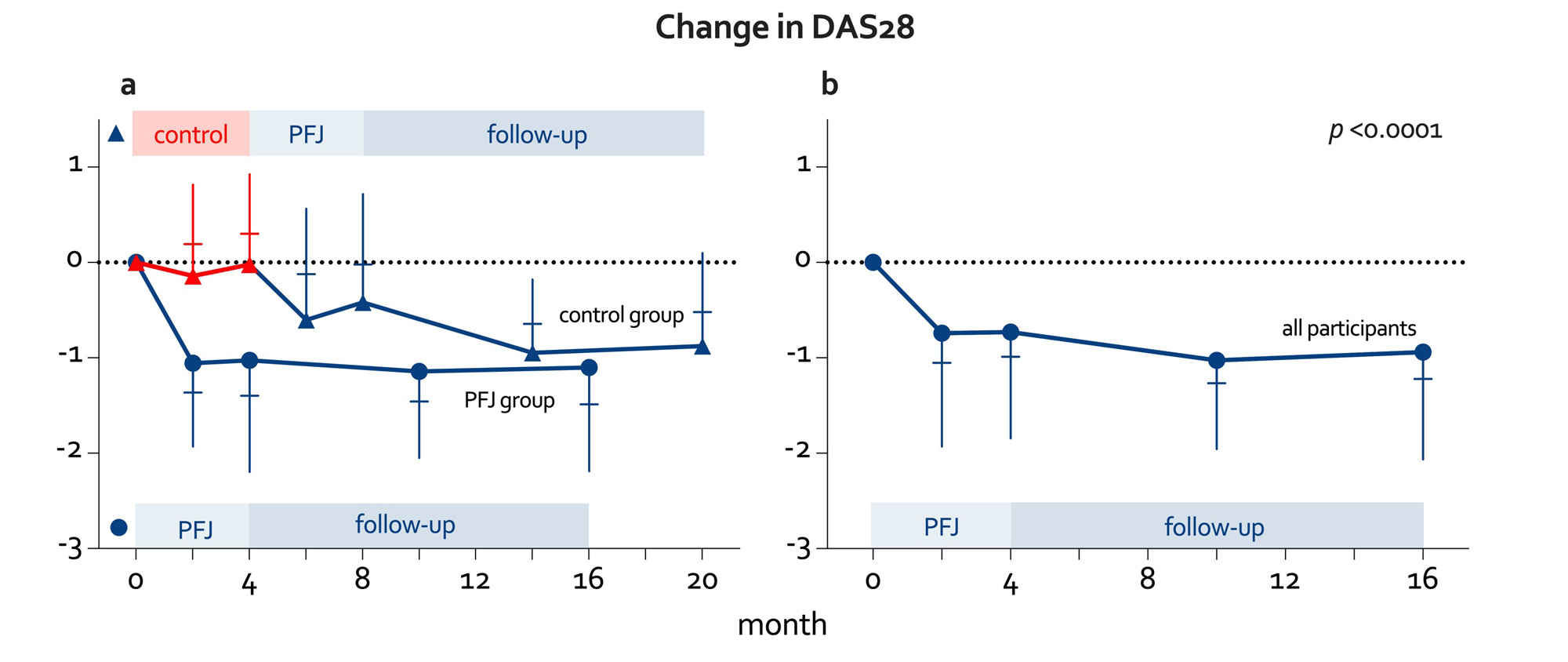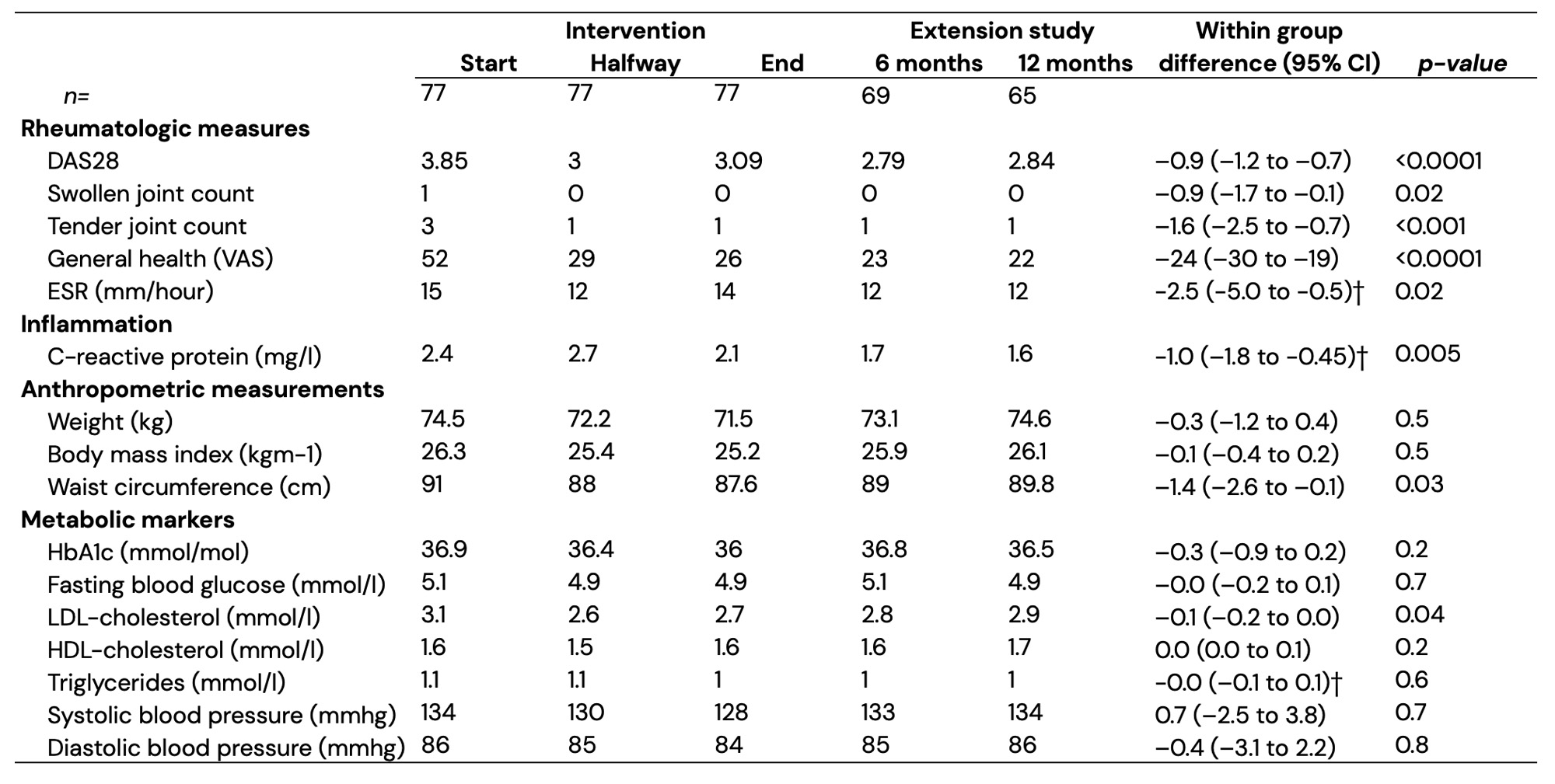Session Information
Session Type: Poster Session B
Session Time: 9:00AM-11:00AM
Background/Purpose: The 16-week Plants for Joints (PFJ) multidisciplinary lifestyle program, based on a whole-food plant-based diet, physical activity, and stress management, significantly reduced 28-joint Disease Activity Score (DAS28) compared to usual care in people with rheumatoid arthritis (RA).1,2 The objective was to determine the long-term effectiveness of the PFJ lifestyle program on disease activity in people with RA.
Methods: In the PFJ assessor-blind randomized clinical trial, people with RA (DAS28 ≥ 2.6 and ≤ 5.1) were randomized to receive the PFJ program in addition to usual care, or the control group which received usual care. After this 16-week period the control group also received the program. After completion of the program all participants were followed-up for one year with biannual visits and six adherence-promoting webinars. Participants with a DAS28 < 2.6 were instructed to taper antirheumatic medication following a pre-specified protocol. Medication changes were assessed at one year as an “increase,” “stable,” or “decrease” compared to baseline by an independent committee. Secondary outcomes included anthropometric and metabolic markers. An intention-to-treat analysis with a linear mixed model was used to analyze within-group differences.
Results: 65 (84%) of the 77 participants, who completed the initial 16-week clinical trial, completed the one-year follow-up. 92% of participants were female with a mean (SD) age of 55 (12) and body mass index of 26 (4) kg/m². In the year after the PFJ program the DAS28 continued to improve slightly whereby a within-group difference of –0.9 points was observed after one year compared to baseline (p < 0.0001) (Figure 1). All components of the DAS28 improved significantly compared to baseline (Table 1). Of the 56 participants who completed the follow-up and used disease modifying anti-rheumatic medication, 27 (48%) decreased or stopped, 16 had stable, and 13 had increased medication. 45 participants (58%) improved DAS28 scores (20 with DAS28 < 2.6) with stable or less medication compared to baseline. After the 1-year follow-up period waist circumference, LDL cholesterol, and CRP remained significantly lower than baseline values, although there was no longer a significant difference in weight or HbA1c.
Conclusion: The PFJ lifestyle program significantly decreased disease activity in people with RA and its effects were sustained till one year after program completion with on average slightly less antirheumatic medication. Metabolic benefits found after the lifestyle intervention were only partially sustained, possibly indicating attenuated adherence to the program in the follow-up.
References 1. Walrabenstein, Trials 2021 2. Walrabenstein, Rheumatology 2023
To cite this abstract in AMA style:
Wagenaar C, Walrabenstein W, Van der Leeden M, Turkstra F, Twisk J, Boers M, van Middendorp H, Weijs P, van Schaardenburg D. Long-term Effectiveness of a Lifestyle Program for Rheumatoid Arthritis: One-year Follow-up of the “Plants for Joints” Randomized Clinical Trial [abstract]. Arthritis Rheumatol. 2023; 75 (suppl 9). https://acrabstracts.org/abstract/long-term-effectiveness-of-a-lifestyle-program-for-rheumatoid-arthritis-one-year-follow-up-of-the-plants-for-joints-randomized-clinical-trial/. Accessed .« Back to ACR Convergence 2023
ACR Meeting Abstracts - https://acrabstracts.org/abstract/long-term-effectiveness-of-a-lifestyle-program-for-rheumatoid-arthritis-one-year-follow-up-of-the-plants-for-joints-randomized-clinical-trial/


